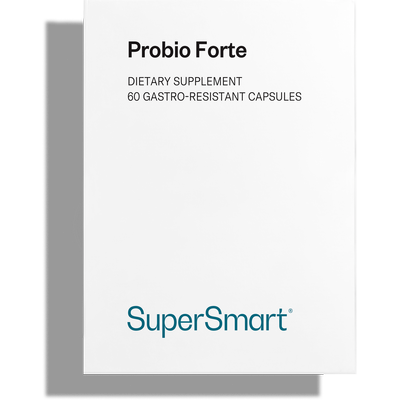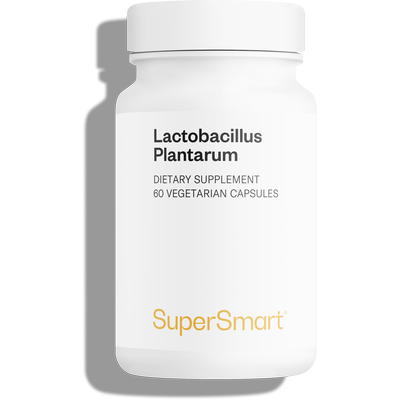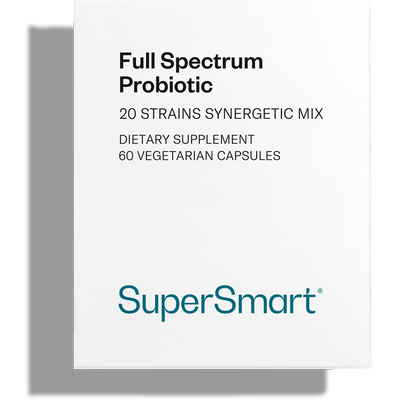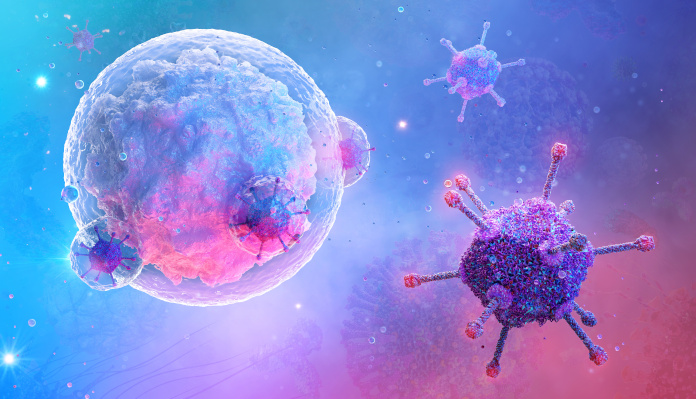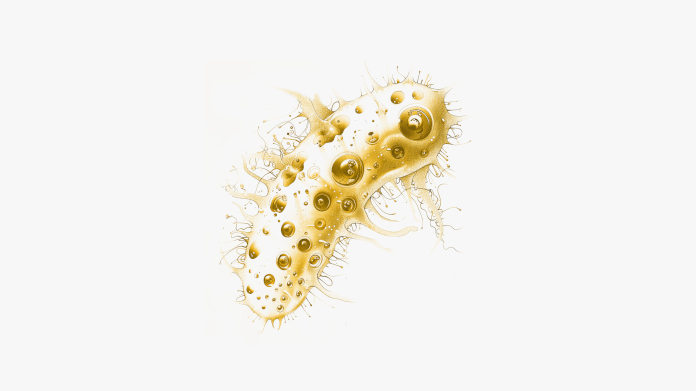Lactobacillus plantarum: 3 benefits of an essential probiotic
Present in the microbiota and in fermented foods, Lactobacillus plantarum is attracting the attention of researchers for its potential benefits. This probiotic could play a role in supporting digestive, immune and metabolic balance...

Lactobacillus plantarum: a bacterium naturally present in the microbiota
Lactobacillus plantarum is a lactic acid bacterium belonging to the Lactobacillus family, a large group of microorganisms studied for their beneficial effects on the intestinal flora (1).
Naturally present in the environment and in our digestive system, this species contributes to the balance of the intestinal microbiota, which is itself involved in immune function.
It is also found in many fermented foods, consumed for centuries for their nutritional qualities and their action on digestion:
- sauerkraut
- lacto-fermented gherkins
- kefir
- sourdough
- dairy products (yoghurt and cheese)
- tempeh
- Korean kimchi
These food sources provide small quantities of Lactobacillus plantarum, but they are not always enough to colonise the intestine over the long term.
In fact, numerous factors, such as gastric acidity, the composition of the existing flora and lifestyle, can limit their long-term establishment.
This is why Lactobacillus plantarum is now widely used in probiotic food supplements.
These concentrated formulations provide standardised doses of live bacteria, capable of resisting passage through the digestive tract and actively supporting the balance of the microbiota.
What science says: 3 potential benefits of Lactobacillus plantarum
Recent research into Lactobacillus plantarum has highlighted the promising effects and benefits of this probiotic. Here's a closer look at 3 particularly interesting areas of research.
1. Support for digestive comfort
Lactobacillus plantarum is known to help balance the intestinal microbiota and is unsurprisingly being studied for its potential benefits for digestion.
In fact, a balanced and diverse microbiota is essential for supporting digestion and regulating intestinal transit (2).
Lactobacillus plantarum is capable of producing natural antimicrobial substances called 'bacteriocins'. These substances are thought to limit the proliferation of certain pathogenic strains in the intestinal tract (3).
The probiotic Lactobacillus plantarum is also involved in the production of lactic acid, which helps to maintain a slightly acidic intestinal pH, creating an unfavourable environment for harmful microorganisms (4).
Other results open up interesting prospects for the use of these probiotics in the treatment of irritable bowel syndrome and other diarrhoeal diseases (5).
2. A potential action on immunity?
Recent studies are also looking at the indirect role Lactobacillus plantarum could play in supporting the immune system.
A healthy, diverse microbiota is closely linked to a better immune response to external aggression (6-7).
Studies suggest that Lactobacillus plantarum may interact with intestinal cells and innate immunity receptors, regulating pro- and anti-inflammatory cytokines (8-9).
These effects could help to strengthen the intestinal barrier (10-11), considered to be a key element in maintaining effective immunity.
Although these mechanisms are still being explored, they pave the way for interesting reflections on the role of probiotics in a global approach to health.
3. A possible impact on metabolism and emotional balance
Some research has also suggested that Lactobacillus plantarum could play a role in several key functions in the body:
- regulating certain metabolic parameters, by positively influencing lipid and glycaemic markers (12-13)
- supporting the gut-brain axis, an emerging field of study exploring the links between gut microbiota, mood and cognitive functions (14)
Although encouraging, these avenues are still exploratory and need to be validated by larger-scale clinical studies.
If carried out on a variety of populations and using rigorous protocols, they would confirm all the potential benefits of Lactobacillus plantarum.
Which probiotic supplements should you choose?
Today, Lactobacillus plantarum is widely used in probiotic food supplements because of its ability to resist gastric acidity and temporarily colonise the intestine.
These formulations are particularly useful for boosting the intake of live bacteria and promoting a balanced microbiota, as a complement to a varied, balanced diet.
Lactobacillus plantarum HK L-137: an innovative and promising strain
Among the different strains studied, Lactobacillus plantarum HK L-137 stands out for its unique properties.
This strain was isolated for the first time from narezushi, a centuries-old fermented sushi (the ancestor of our modern sushi).
Inactivated by heat to enhance its properties, the Lactobacillus plantarum HK L-137 strain helps form a postbiotic called Immuno-LP20™.
Thanks to its action on IL-12 cytokines, this postbiotic could support the immune system. We could even talk about it as a genuine ‘immunobiotic’.
![]() Discover Lactobacillus Plantarum Postbiotic, an innovative microbiotic supplement that provides 2 billion microorganisms per day.
Discover Lactobacillus Plantarum Postbiotic, an innovative microbiotic supplement that provides 2 billion microorganisms per day.
Probiotic synergies for even more benefits
In addition to this specific strain, Lactobacillus plantarum is also included in probiotic synergies.
These supplements combine several species of probiotics to help balance the intestinal microbiota, boosting the effects on intestinal flora and digestive comfort.
![]() Discover Probio Forte, a powerful multi-strain probiotic for the intestinal microbiota. It contains 8 billion microorganisms per capsule, with 5 different species: Bifidobacterium lactis, Lactobacillus acidophilus, casei, plantarum and Lactococcus lactis.
Discover Probio Forte, a powerful multi-strain probiotic for the intestinal microbiota. It contains 8 billion microorganisms per capsule, with 5 different species: Bifidobacterium lactis, Lactobacillus acidophilus, casei, plantarum and Lactococcus lactis.
![]() Also discover Full Spectrum Probiotic, a '20-in-1' supplement of exceptional diversity and effectiveness, bringing together the best strains for microbiota diversity and balance.
Also discover Full Spectrum Probiotic, a '20-in-1' supplement of exceptional diversity and effectiveness, bringing together the best strains for microbiota diversity and balance.
Although it is still too early to attribute specific claims to Lactobacillus plantarum beyond its role in the intestinal microbiota, this bacterium is attracting real scientific interest.
New research may soon provide a better understanding of its many benefits for the body...
SUPERSMART ADVICE
References
- Seddik HA, Bendali F, Gancel F, Fliss I, Spano G, Drider D. Lactobacillus plantarum and Its Probiotic and Food Potentialities. Probiotics Antimicrob Proteins. 2017 Jun;9(2):111-122. doi: 10.1007/s12602-017-9264-z. PMID: 28271469.
- Adak A, Khan MR. An insight into gut microbiota and its functionalities. Cell Mol Life Sci. 2019 Feb;76(3):473-493. doi: 10.1007/s00018-018-2943-4. Epub 2018 Oct 13. PMID: 30317530; PMCID: PMC11105460.
- Nettoor Veettil V, A VC. Optimization of bacteriocin production by Lactobacillus plantarum using Response Surface Methodology. Cell Mol Biol (Noisy-le-grand). 2022 Jun 30;68(6):105-110. doi: 10.14715/cmb/2022.68.6.17. PMID: 36227669.
- Echegaray N, Yilmaz B, Sharma H, Kumar M, Pateiro M, Ozogul F, Lorenzo JM. A novel approach to Lactiplantibacillus plantarum: From probiotic properties to the omics insights. Microbiol Res. 2023 Mar;268:127289. doi: 10.1016/j.micres.2022.127289. Epub 2022 Dec 22. PMID: 36571922.
- Zhang H, Xia Y, Wang G, Xiong Z, Wei G, Liao Z, Qian Y, Cai Z, Ai L. Lactobacillus plantarum AR495 improves colonic transport hyperactivity in irritable bowel syndrome through tryptophan metabolism. Food Funct. 2024 Jul 15;15(14):7416-7429. doi: 10.1039/d4fo01087f. PMID: 38899520.
- Yuan C, He Y, Xie K, Feng L, Gao S, Cai L. Review of microbiota gut brain axis and innate immunity in inflammatory and infective diseases. Front Cell Infect Microbiol. 2023 Oct 4;13:1282431. doi: 10.3389/fcimb.2023.1282431. PMID: 37868345; PMCID: PMC10585369.
- Wastyk HC, Fragiadakis GK, Perelman D, Dahan D, Merrill BD, Yu FB, Topf M, Gonzalez CG, Van Treuren W, Han S, Robinson JL, Elias JE, Sonnenburg ED, Gardner CD, Sonnenburg JL. Gut-microbiota-targeted diets modulate human immune status. Cell. 2021 Aug 5;184(16):4137-4153.e14. doi: 10.1016/j.cell.2021.06.019. Epub 2021 Jul 12. PMID: 34256014; PMCID: PMC9020749.
- Yang KM, Zhu C, Wang L, Cao ST, Yang XF, Gao KG, Jiang ZY. Early supplementation with Lactobacillus plantarum in liquid diet modulates intestinal innate immunity through toll-like receptor 4-mediated mitogen-activated protein kinase signaling pathways in young piglets challenged with Escherichia coli K88. J Anim Sci. 2021 Jun 1;99(6):skab128. doi: 10.1093/jas/skab128. PMID: 33928383; PMCID: PMC8212570.
- Zhao W, Peng C, Sakandar HA, Kwok LY, Zhang W. Meta-Analysis: Randomized Trials of Lactobacillus plantarum on Immune Regulation Over the Last Decades. Front Immunol. 2021 Mar 22;12:643420. doi: 10.3389/fimmu.2021.643420. PMID: 33828554; PMCID: PMC8019694.
- Lu J, Shataer D, Yan H, Dong X, Zhang M, Qin Y, Cui J, Wang L. Probiotics and Non-Alcoholic Fatty Liver Disease: Unveiling the Mechanisms of Lactobacillus plantarum and Bifidobacterium bifidum in Modulating Lipid Metabolism, Inflammation, and Intestinal Barrier Integrity. Foods. 2024 Sep 21;13(18):2992. doi: 10.3390/foods13182992. PMID: 39335920; PMCID: PMC11431124.
- Chen Y, Ma W, Zhao J, Stanton C, Ross RP, Zhang H, Chen W, Yang B. Lactobacillus plantarum Ameliorates Colorectal Cancer by Ameliorating the Intestinal Barrier through the CLA-PPAR-γ J Agric Food Chem. 2024 Sep 11;72(36):19766-19785. doi: 10.1021/acs.jafc.4c02824. Epub 2024 Aug 26. PMID: 39186442.
- Chen H, Zhao H, Qi X, Sun Y, Ma Y, Li Q. Lactobacillus plantarum HF02 alleviates lipid accumulation and intestinal microbiota dysbiosis in high-fat diet-induced obese mice. J Sci Food Agric. 2023 Jul;103(9):4625-4637. doi: 10.1002/jsfa.12538. Epub 2023 Mar 18. PMID: 36866521.
- Zhao L, Shen Y, Wang Y, Wang L, Zhang L, Zhao Z, Li S. Lactobacillus plantarum S9 alleviates lipid profile, insulin resistance, and inflammation in high-fat diet-induced metabolic syndrome rats. Sci Rep. 2022 Sep 15;12(1):15490. doi: 10.1038/s41598-022-19839-5. PMID: 36109620; PMCID: PMC9478128.
- Liu YW, Liong MT, Tsai YC. New perspectives of Lactobacillus plantarum as a probiotic: The gut-heart-brain axis. J Microbiol. 2018 Sep;56(9):601-613. doi: 10.1007/s12275-018-8079-2. Epub 2018 Aug 23. PMID: 30141154.
1 Days
GOOD BRAND IN FOOD COMPLEMENTS
GOOD BRAND IN FOOD COMPLEMENTS - SERIOUS WITH GOOD DOCUMENTS AND DETAILS SCIENTIST. AND SERIOUS HONNEST COMMERZIALISATION. I HAVE TRUST IN THEIR PRODUCTS.
FENOGLIO Guy
2 Days
Very good experience
Very good experience, the products arrived in time, in perfect condition and are good quality. Thank you.
GABI TIRCOCI
8 Days
very good expereince
very good expereince
Jelena Đaković
8 Days
Very good products.
Very good products.
Agnes BENDSAK
10 Days
Just OK
Just OK, ordering from company for many years and being safisfied
Lynn Mae
11 Days
Recomendo
Produtos encomendados são recebidos atempadamente e de acordo com o anunciado! Muito satisfeita!
Carla Sofia
11 Days
Everything is great!
Everything is great!
Jonas
16 Days
The delivery was fast and the product…
The delivery was fast and the product is great
SOMMARIVA Gianni
17 Days
Great service and lots of information
Great service and lots of information
Gabi
20 Days
Service Satisfaction
I’m satisfied with the service; it fulfilled what it set out to do.
Anfhony Abreu
23 Days
Original product and fast delivery
Original product and fast delivery. I haven't started it yet, but will do soon.
Vincenza Catania
26 Days
Good quality
Good quality. Good service.
Leonel Guzman
28 Days
Top!!!!!!!!
Top!!!!!!!!
Michael
30 Days
Excellent!
Products are great and delivered fast!
PARDINI Debora
31 Days
From order to receive the product
From order to receive the product, the process is smooth & fast. It’s good to customers.
WONG Mei Ling
of experience
your money back
##montant## purchase


